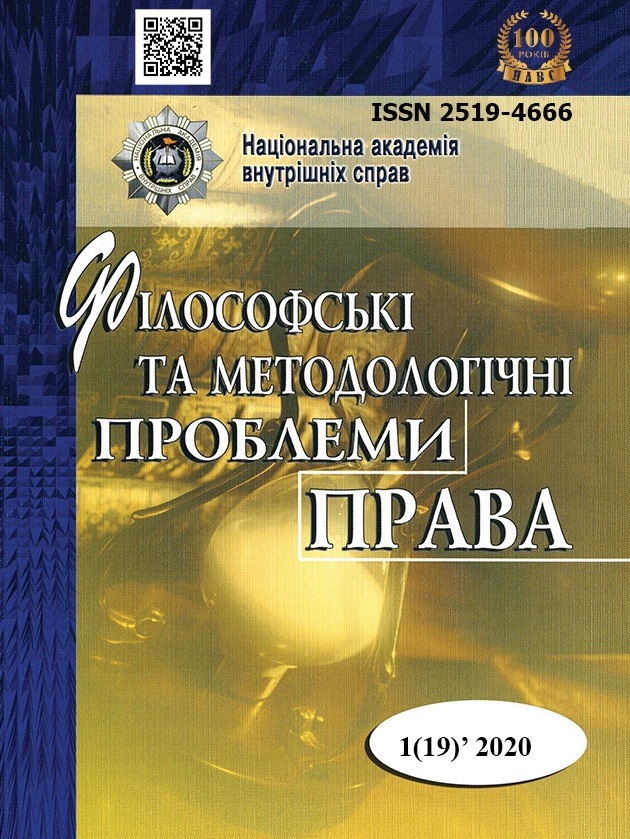State and Political Views in the Universalist System of Pythagoras’ Worldview
Abstract
The purpose of this article is to introduce (or return) into scientific circulation information about the forgotten universal ancient thinker, philosopher and sage – Pythagoras. He was the originator of European philosophy, science, culturology, musicology, and others. In the holistic teaching of the thinker it is necessary to highlight the state and political views that served as the basis for their development by other ancient philosophers and sages. The methodological basis of the content of this article is mathematical and logical methodology (see my articles in the journals «Philosophical and methodological problems of law» № 1–2 for 2013 and № 1 for 2014, «Legal psychology and pedagogy»№ 1 (15) for 2014). The scientific novelty is that the author for the first time sees the teachings and worldview of Pythagoras as a whole (not even a mosaic) in which the statesmanship and political views of the thinker are inextricably represented. Domestic and foreign scholars ignore the figure of Pythagoras and his teachings in silence or in a few sentences (sometimes pages). An exception is the monograph and scientific articles of my student Professor Serhiy Melenko. Conclusions: I believe that the legacy of Pythagoras should be studied holistically (or at least comprehensively) and return this name to the history of philosophy, the history of philosophy of law, the history of science in general.
Keywords: Pythagoras; pythagorean community; acoumatics; mathematics; cosmology; soul; pythagorean ethics; state; political system.
Downloads
References
Аристотель. Сочинения в четырех томах. М. : Мысль, 1976. Т. 1. 550 с.
Блаватская Е. Тайная доктрина: Эзотерическое учение : в 2 кн. / пер. с англ. М. : АСТ, 2003. Кн. 1. 397 с.
Будко В. В. Философия науки : учеб. пособие. Харьков : Консум, 2005. 268 с.
Чумаченко Б. М. Вступ до культурології античності. Стародавня Греція : навч. посіб. Київ : Академія, 2003. 100 с.
Гегель Г. В. Ф. Лекции по истории философии. СПб. : Наука, 1993. Кн. 1. 350 с.
Гокінґ С. Теорія всього : зб. лекцій. Харків : Клуб сімейного дозвілля, 2019. 160 с. doi: http://doi.org/10.11.19/1.48.65548.
Kaufman A. Rechtphilosophis. München : C. H. Becrʼsche Velagsbuchhandlung, 1997. 365 р.
Kerferd G. B. What can we Know of Pythagoras? C. J. de Vogel: Pythagoras and Early Pythagoreanism: an interpretation of neglected evidence of the philosopher Pythagoras. P. 323 ; 6 plates. Assen : Van Gorcum, 1966. Cloth, fl. 28.50. The Classical Review. Cambridge : Cambridge University Press, 2009. doi: https://doi.org/10.1017/S0009840X0032755X.
Лаэртский Д. О жизни, учениях и изречениях знаменитых философов. М. : Мысль, 1979. 620 с.
Фрагменты ранних греческих философов / под ред. А. В. Лебедев. М. : Наука, 1989. Ч. І. 576 с.
MacRis C. Pythagoras. The History of Western Philosophy of Religion / Ed. By G. Oppy. London : Acumen Publishing, 2013. P. 23–40. doi: https://doi.org/10.1017/UPO9781844654635.003.
O’Meara D. J. Pythagoras Revived: Mathematics and Philosophy in Late Antiquity. Oxford : Oxford Scholarship Online, 2004. URL: https://www.oxfordscholarship.com/view/10.1093/0198239130.001.0001/acprof-9780198239130. doi: 10.1093/0198239130.001.0001.
Овчинников Н. Ф. Тенденция к единству науки. М. : Наука, 1988. 272 с.
Пифагор. Золотой канон. Фигуры эзотерики. М. : ЭКСМО-Пресс, 2001. 448 с.
Пифагор, Эпиктет. Пифагоровы законы и нравственные правила. Афоризмы этикета. М. : Олма-Пресс ; СПб. : Нева ; Скриптириум, 2000. 384 с.
Popkin R. H., Stroll A. Filozofia. Poznan : Zysa i S-ra Wudawnictwo, 1994. 528 р.
Radbruch G. Rechtsphilosophic. Heidelberg : C. F. Müller, 1999. 278 p.
Редкин П. Г. Из лекций по истории философии права в связи с историей философии вообще : в 7 т. СПб. : М. М. Стасюлевич, 1889. Т. 2. 403 с.
Doctrine and Doxography. Studies on Heraclitus and Pythagoras / Ed. By D. Sider, D. Obbink. Berlin : De Gruyter, 2013. 349 p. doi: https://doi.org/10.1515/9783110331370.
Slipro T. Sy Zarys etuki ogolney. Krakow : Wudawnictwo Wam, 2009. 455 р.
Вернадський В. Наукова думка як планетарне явище. Український культурологічний альманах. 2004. Вип. 57–58. 824 с.
Юркевич П. Історія філософії права. Філософія права. Філософський щоденник. Київ : Укр. світ, 1999. 756 с.
Zhmud L. What is Pythagorean in the Pseudo-Pythagorean Literature? Philologus. 2018. Vol. 163. Issue 1. P. 72–94. doi: https://doi.org/10.1515/phil-2018-0003.
Abstract views: 314 PDF Downloads: 608
Copyright (c) 2020 Philosophical and Methodological Problems of Law

This work is licensed under a Creative Commons Attribution-NonCommercial-NoDerivatives 4.0 International License.
- Authors reserve the right to authorship of their own work and transfer to the magazine the right of the first publication of this work under the terms of the Creative Commons Attribution License, which allows other persons to freely distribute published work with mandatory reference to authors of the original work and the first publication of an article in this magazine.
- Authors have the right to enter into separate additional agreements on non-exclusive dissemination of the work in the form in which it was published in the journal (for example, to post an article in the institution's repository or to publish as part of a monograph), provided that the link to the first publication of the work in this journal is maintained.
- The journal's policy allows and encourages the posting of articles by authors on the Internet (for example, in electronic storehouses of institutions or on personal websites), both before the submission of this manuscript to the editorial office and during its editorial processing, as this contributes to the creation of a productive scientific discussion and positively affects the efficiency and dynamics of citing the published work.




